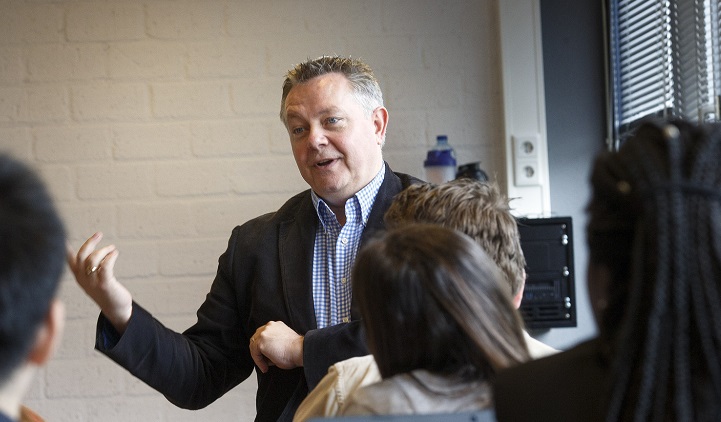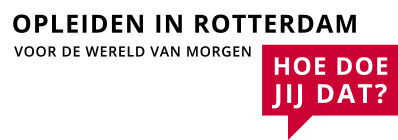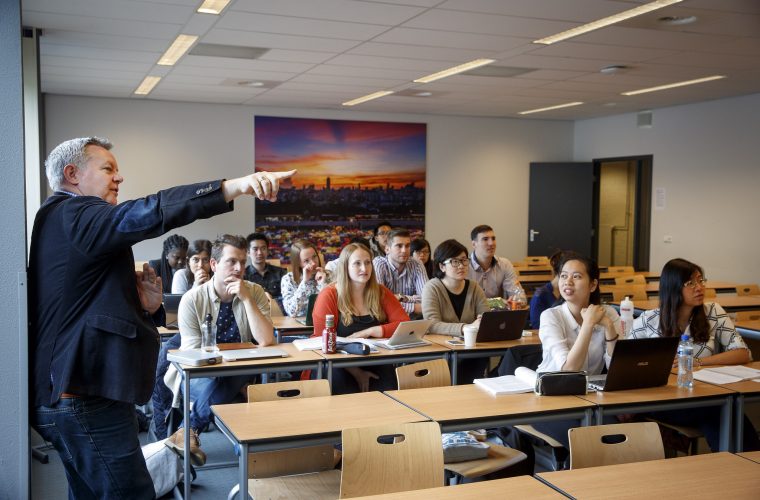De masteropleidingen van RBS verkennen ‘Education on Demand’
Available in English below
Hebben onze studenten maximaal profijt van de manier waarop we op dit moment lesgeven? De theorie en kennis is zeker beschikbaar, maar zou een meer flexibele vorm van onderwijs een verbetering kunnen zijn? In een interview met Martin Ford, onderwijsmanager van de RBS masters, bespreken wij hoe zij de onderwijsvorm ‘Education on Demand’ al toepassen. En we verkennen de verdere mogelijkheden voor het invoeren hiervan op onze hogeschool.
Wat is Education on Demand?
Google zoekresultaten voor deze term laten zien: … Zelfstandig (online) onderwijs en aangepaste trainingsprogramma’s…
Volgens Martin is het concept niet nieuw, het is al terug te vinden in artikelen uit de jaren negentig. Het opleidingsteam van de masters haalde het idee weer van stal na kritische opmerkingen over het huidige onderwijs. Martin: “We horen steeds dat het onderwijs zoals het nu is aan het uitsterven is. En dat als je je eraan vasthoudt, je je doelgroep verkleint”. Naar zijn mening zijn de docenten van de RBS masteropleidingen nogal ambitieus, proberen ze graag nieuwe dingen. Zoals bij voorbeeld studenten thuis laten voorbereiden met film en leesmateriaal en daarna een werkgroep over deze stof houden.
Kun je enkele voorbeelden geven van ‘Education on Demand’ in de praktijk bij de RBS masters?
“Vorig jaar hadden we hier enkele studenten uit China. Geen gewone studenten, zij werkten in China ook als senior manager. Zij waren geïnteresseerd in specifieke onderwerpen als de Rotterdamse haven, transport, en logistiek. We hebben daarom een apart vakkenpakket gerealiseerd voor deze groep, met gebruik van bestaande en nieuwe modules. Dat onderwijs was volledig ‘on demand’.” 
Martin Ford voor de klas
Een ander voorbeeld is een student die meer wilde leren over block chain, een onderwerp dat niet in het curriculum zit. Wij hebben ‘Education on Demand’ toegepast waardoor hij kon leren over het gewenste onderwerp. Deze student had mij benaderd met deze vraag en we hebbenhem een mentor toegewezen. De student organiseerde zijn lesprogramma zelf, hij heeft voor ons een lezing geregeld door een expert van IBM. Wij hebben hem ook meegenomen naar het Venture Café waar zo’n 200 ondernemers actief zijn met startups. Alles wat hij leerde was extracurriculair en ook helemaal ‘on demand’, en gefaciliteerd door het opleidingsteam.”
Wat vond de student in kwestie hiervan?
“Zijn feedback over de gehele ervaring was zeer positief. Hij was niet alleen student, maar maakte ook deel uit van ons team, omdat hij ook een aantal evenementen organiseerde namens de school waar we allemaal wat aan hadden. Hij voelde zich echt opgenomen hier op de afdeling.’
Wat is er mogelijk aan flexibel onderwijs bij de masters en wat zijn volgens jou de mogelijkheden voor de hele hogeschool?
“Met ‘Education on Demand’ zou je naar keuze modules van de drie RBS masteropleidingen kunnen volgen: Consultancy & Entrepreneurship , Logistics Management en Finance & Accounting. Een student kiest dan vakken van deze drie opleidingen en creëert daarmee zijn/haar eigen opleiding op maat, een individueel programma waarbij hij of zij kennis en vaardigheden opdoet en studiepunten opbouwt om uiteindelijk een diploma te krijgen. De mogelijkheden hiertoe bespreken we op dit moment met het opleidingsteam. Studenten worden dan uiteindelijk een soort consultant met verschillende en specifieke expertises.
Hogeschool Rotterdam heeft ongeveer twintig masteropleidingen, dus we zouden in theorie verder kunnen kijken dan alleen RBS. Waarom kunnen we een RBS student Logistiek niet naar een master van een ander instituut sturen om studiepunten te halen? Waarom zou een vrijer curriculum niet mogelijk kunnen zijn op een hogeschool zo groot als de onze?
Omdat we inmiddels enige ervaring hebben, en nu ook in financiële zin iets meer vrijheid hebben, is het voor ons interessant om te experimenteren met een vrijer curriculum. Komende zomer organiseren we bijvoorbeeld een kennismakingscursus ‘Introduction to Logistics’. Bij de Master Logistics Management mogen we studenten aannemen met een bachelor in een ‘business’ opleiding. Met de introductiecursus krijgen ze de grondbeginselen van logistiek en integraal ketenbeheer, waarna ze de reguliere master Logistics kunnen gaan volgen”.
Wat heb je zelf geleerd van het implementeren van ‘Education on Demand’? Nog advies voor andere leraren, of onderwijsmanagers?
“De voornaamste les is te luisteren naar de wensen van studenten en professionals in het werkveld. Ga er niet vanuit dat jij het bij het juiste eind hebt.
Afgelopen jaar hebben we een parttime Executive opleiding ‘Logistics Management’ aangeboden die ontwikkeld was in nauwe samenwerking met het werkveld. Vooraf dachten we allerlei geweldige ideeën te hebben die bij hen zouden passen. Maar door de dialoog aan te gaan bleek dat hun ideeën en wensen niet helemaal aansloten bij de onze.
We hopen meer te gaan samenwerken met het kenniscentrum Business Innovation, wat ons zal helpen ons meer te verbinden met bedrijven in de regio. Dan kunnen we hen helpen hun actuele vraagstukken op te lossen en die cases kunnen gebruiken in het onderwijs om het zo nog interessanter te maken voor onze studenten.”
Dat meer opleidingen bezig zijn met het aanbieden van stukjes onderwijs, laat ook Profielen zien in dit artikel.
English version
Is a more flexible model of education the future?
Exploring Education on Demand at the RBS Master programmes
Do our students benefit to a maximum degree from the way we are teaching at this time? The theory is available, but can a more flexible application improve our education? In an interview with Martin Ford, the Course Director of the RBS Master programmes (also known as the Graduate Department), we discussed how they have already applied Education on Demand. And we also explored possibilities for additional applications of ‘Education on Demand’ at our university of applied sciences.
What is Education on Demand?
A Google search results in the following explanation: …Self-paced (online) training and customised training programmes…
According to Martin the concept is not new, but can be found in articles as far back as the nineties. At the Graduate Department, it was evaluated again due to comments about traditional education. Martin: “We keep hearing that the classroom as it is, is dead, and you restrict yourself to a certain audience by having traditional lessons.” In his opinion the lecturers teaching the RBS Master Programmes are quite ambitious, and eager to try new things. For example, by organising a purely practical session backed by a lecture on film and a reading assignment.
Can you give some examples of applying Education on Demand at the RBS Master Programmes?
“Last year some students, also senior managers in China, were here in Rotterdam, and interested in subjects such as our port area, transportation, and logistics. They were seeking specific education. We delivered a package course especially for them, using existing and new modules. The whole course was on demand.’
Another example is a student who wanted to know about a subject, Block Chain, not covered in the curriculum. Education on Demand was used so that he was able to gain the desired knowledge. The student approached Martin and he was assigned a mentor. The student himself organised, among other things, lectures bringing in a specialist from IBM. The student was also introduced to the Venture Café where approximately 200 entrepreneurs are involved in Start-up businesses. The student’s experience was extra-curricular and totally ‘on demand’, facilitated by the Graduate Department.”
How did the student react to this experience?
“He was very positive about the experience. During this experience he was not only a student, but also member of our team. He organised events that everybody benefitted from including ourselves. He really did feel included.”
What are some possibilities for flexible education at the Graduate Department and beyond?
“Education on Demand can mean extracting modules from our three Master programmes: Consultancy and Entrepreneurship; Logistics Management; Finance and Accounting.
A student picks out elements of each of the three programmes and creates a tailor-made course. The student creates an individual menu providing them with the knowledge and competencies that they need as they earn credits towards their diploma. This possibility is being discussed at the moment. ‘Students will become consultants in their own right but with different, specific expertise. This development could be one way of the Master programmes going forward.’
Rotterdam University of Applied Sciences has twenty Master programmes, so it is possible in theory to look beyond the RBS Masters. Martin: ‘Why can’t we send our Logistics student to another Master and earn some credit points there? Why, with a university of applied science of this size, could we not explore a more free curriculum?
Because we have had a taste now, and we have a little more commercial freedom than we have had previously, a free curriculum is something we are excited to explore. For example, a summer ‘taster’ course ‘Introduction to Logistics’. For our Master Logistics Management, we are allowed to accept students that have a Bachelor that is ‘Business related’, so the students have a knowledge of business, but not necessarily Logistics, or Supply Chain Management. The introduction ‘taster’ course will help prepare them for subsequent Master education.”
What did you learn yourself from using Education on Demand? Any advice for other lecturers?
“The lesson that we have learnt is to really listen. Do not assume that you have got it right. Listen closely and fully understand what students and the professional field are asking for. In the past year the we have developed a part-time Executive Programme for Logistics Management, in close connection with the professional field. We thought we had lots of great ideas that would suit them. But by talking to the field it turned out that their ideas are slightly different than ours.
There are plans for us to work more closely together with the Research Centre Business Innovation, which will help us connect to regional companies providing us with current case studies. The intention now is to use those current cases to make it even more interesting for the students.”

